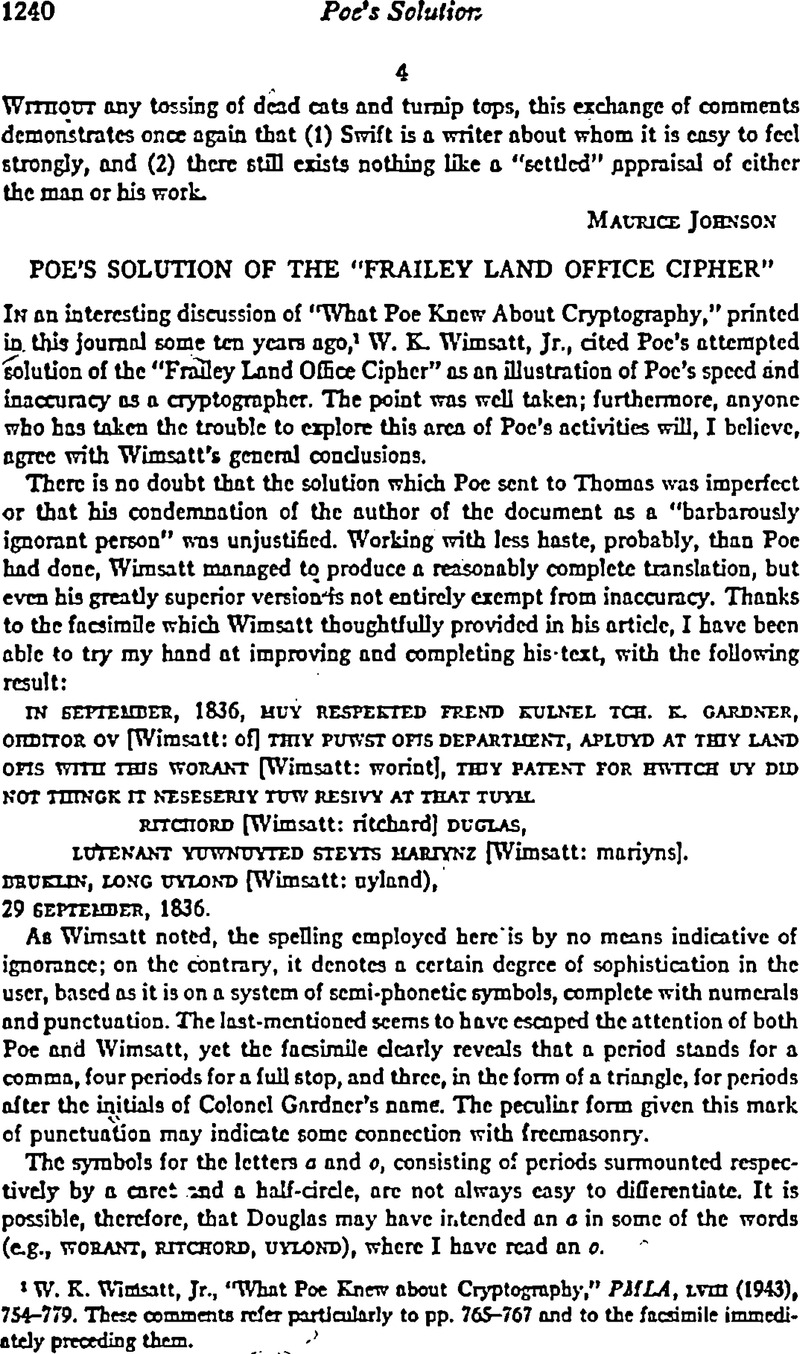No CrossRef data available.
Article contents
Poe's Solution of the “Frailey Land Office Cipher”
Published online by Cambridge University Press: 24 March 2021
Abstract

- Type
- Notes, Documents, and Critical Comment
- Information
- Copyright
- Copyright © Modern Language Association of America, 1953
References
page 1232 note 7 Ath , 25 May 1872, p. 651.
page 1232 note 1 “A Literary Chestnut: Dryden's ‘Couain Swift’,” PMLA, lxvii (1952), 1024-34.
page 1232 note 2 The Critical Works of John Demnis, ed. E. N.Hooker (Baltimore, 1939-43), ii, 400-401.
page 1233 note 3 Swift's Correspondence, iv, 163; ii, 199.
page 1233 note 4 Ibid., v, 162.
page 1233 note 5 Miscallansous Works, ed. A. C. Guthkelch (London, 1914), i, 3.
page 1233 note 6 George W. Cunningham, London (London, 1927), pp. 66-67.
page 1234 note 7 The Poems of Jonathan Swift, ed. Harold Williams (Oxford, 1937), ii, 644-642.
page 1235 note 1 Reapectively, Bernard Shaw, Poatscript to Back to Methuselah, World's Clancis Ed. (New York, 1946), p. 260; D. H. Lawrence, Introd. to The Pointings of D. H. Lourence (London, n.d.), no pagination; T. S. Eliot, “Cyril Tourneur,” Selacted Essays: 1917-1932 (New York, 1932), p. 167; Aldous Huxley, “Swift,” Do What You Will (New York, 1929), p. 105; Edith Sitwell, Alexander Pope (New York, 1930), p. 104; and André Breton, Manifeste du Surr (1924), quoted in The Burspound Cor, ed. Samuel Putnam et at (New York, 1931), p. 171.
page 1235 note 2 John Hayward, “Jonathan Swift,” From Anne to Victoria: Essays by Verieus Hounds, ed. Bonamy Dobr (New York, 1937), pp. 35-36.
page 1235 note 3 A. E. Case, “Swift's Supposed Ingratitude toward His Uncle Godwin: A Surmise,” Pope and His Contemporaries: Essays Presented to George Sherhurn, ed. J. L. Cliford and L. A. Landa (Oxford, 1949), pp. 129-134.
page 1235 note 4 Oliver St. John Gogarty, “Dean Swift as a Human Being,” A Monthly, clxxxvi (Oct 1950), 56.
page 1236 note 5 “Biographical Evidence: Jonathan Swift,” English Inst. Essays, 1946 (New York, 1947), pp. 20-40.
page 1236 note 6 “Methods in Books about Swift,” SP, xxxv (Oct 1938), 635, 645.
page 1236 note 7 “Palomode. What with our antic habits and feigned voices,—Do you know mel and—I know you,—methinks we move sud talk just like so many overgrown puppets.” Dryden, Marriege la Mods, Act iv, Scene ii.
“Neither can I find that our art hath gained much by the happy revival of masquerading among us, the whole dialogue in those meetings being summed up in one (sprightly I confess, but) single question, and as sprightly an answer. 'Do you know me?' 'Yes, I do,' And, 'Do you know me?' 'Yes, I do'.” Swift, “Master Wagstaff's' Introduction to Pol Conversation, in Works, ed. Temple Scott (London, 1900-08), xi, 219.
page 1237 note 8 See B. H. Branson, “The Double Tradition of Dr. Johnson,” ELH, xviii (June 1951), 90-106.
page 1237 note 9 William Barrett, “Writers and Madness,” Partisan Rev., xiv (Jan.-Feb. 1947), 12.
page 1238 note 1 Correspoundences, i, 100, 131, 182.
page 1238 note 2 Facsimile in Garnett and Gosse, English Literature: An Illustrated Racord (London, 1903), iii, 228.
page 1238 note 3 Correspounden, i, 168 and n. 3, 188 and n. 1.
page 1238 note 4 Horace Walpole, A Cotalogue of the Royel and Noble Authers of Ěgland, 2nd ed. (London, 1739), ii, 107-108.
page 1238 note 5 John Nichols, Literary Anacdotez of the Eighteenth Conhury (London, 1811-15), viii, 97, .
page 1239 note 6 Correspondence, v, 162.
page 1239 note 7 The Poems of Jonathan Swift, ed. Harold Williams (Oxford, 1937), i, 69, 139, 270 (two); ii, 359, 373, 498, 546, 547, 548, 675, 689; iii, 997-998 (two), 515.
page 1239 note 8 The Works of Alexander Pepe Esq. (London, 1751), iv, 143.
page 1239 note 9 The Poems of Jonathan Swift, i, 139.
page 1240 note 1 W. K. Wimsatt, Jr., “What Poe Knew about Cryptography,” PMLA, lviii (1943), 754-779. These comments refer particularly to pp. 765-767 and to the facsimile immediately preceding them.




